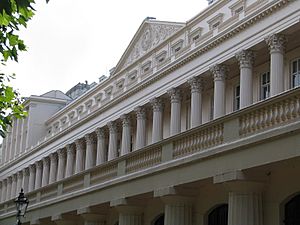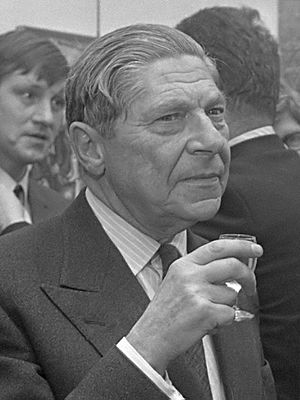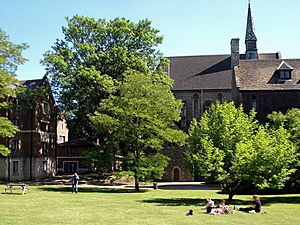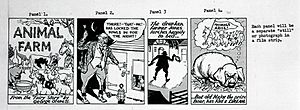Information Research Department facts for kids
 Carlton House Terrace, the original home of the Information Research Department's propaganda activities |
|
| Agency overview | |
|---|---|
| Formed | 1948 |
| Dissolved | 1977 |
| Jurisdiction | United Kingdom |
| Employees | Estimated 400-600 at height. |
| Parent agency | Foreign Office |
The Information Research Department (IRD) was a secret British government department. It was created during the Cold War to spread information against communism. This included creating "black propaganda," which means spreading false information or "fake news" to trick people.
The IRD also supported politicians, thinkers, and writers who were against communism. It used information to challenge not only its main targets but also some socialist groups and movements fighting for independence. Soon after it started, the IRD also began to spread information that supported colonial rule. This was meant to stop independence movements in places like Asia, Africa, Ireland, and the Middle East.
The IRD was very active in publishing books, newspapers, leaflets, and journals. It even set up its own publishing companies to hide its true purpose. Operating for 29 years, the IRD is known as the longest-running secret government information department in British history. It was also the largest part of the Foreign Office. It was the first major English-speaking effort to spread information against the Soviet Union after World War II. By the 1970s, the IRD was also helping the British military in Northern Ireland during The Troubles.
The IRD promoted works by many authors who were against communism. These included famous writers like George Orwell, Arthur Koestler, Bertrand Russell, and Robert Conquest. The IRD was involved in many important world events. These included Britain joining the European Economic Community, the Korean War, the Suez Crisis, the Malayan Emergency, The Troubles, the Mau Mau Uprising, and the Cyprus Emergency. The IRD also created fake letters and posters. It spread negative stories about British trade union leaders and planted false news stories in British newspapers.
The British public did not know about the IRD until the 1970s. However, the Soviet Union knew about it from the start. This was because a spy named Guy Burgess worked there for a short time in 1948. The IRD stopped its work in 1977. This happened after British journalists discovered its existence. They were investigating a lot of anti-Soviet information being published by academics at St Antony's College, Oxford. A newspaper story in The Guardian called "Death of the Department that Never Was" by David Leigh was the first time the public officially learned about the IRD.
Contents
Why the IRD Was Created
Since 1946, many important officials in the Foreign Office and the Labour Party wanted to create a department to spread information against communism. Christopher Warner first suggested this in April 1946. However, the Foreign Secretary, Ernest Bevin, did not want to upset members of the Labour Party who were friendly with the Soviet Union.
Later, Bevin rejected another idea from Ivone Kirkpatrick for an anti-communist group. In 1947, Christopher Mayhew pushed for these ideas again. He connected being against communism with the idea of a "Third Force." This force would be a progressive group that was not allied with either the Soviet Union or the United States.
This idea, along with Soviet information attacks against Britain, made Bevin change his mind. He started discussing how to create such a department. After sending a secret paper to Ernest Bevin in 1947, Mayhew was called by Prime Minister Clement Attlee to discuss it further.
On January 8, 1948, the British government officially approved a plan called Future Foreign Publicity. This plan was written by Christopher Mayhew and signed by Ernest Bevin. The plan strongly supported being against communism. It stated that the British Labour Government should lead the fight against communism around the world.
To achieve these goals, the plan called for a new department in the Foreign Office. This department would "collect information" about Communism. It would also "provide material for our anti-Communist publicity" through British offices and information services abroad. The new department would work with government ministers, British representatives, the Labour Party, and the BBC Overseas Service. This new department was finally set up as the Information Research Department. Mayhew and Sir Ivone Kirkpatrick led the department until 1950. The first offices were in Carlton House Terrace, London, before moving to Riverwalk House.
People Who Worked for the IRD
The IRD was one of the largest and best-funded parts of the UK Foreign Office. At its busiest, it had an estimated 400 to 600 employees. Even though the IRD was started under Clement Attlee's Labour Party government (1945-1951), it was led by many different politicians from both the Labour Party and the Conservative Party. These leaders included Ralph Murray, John Rennie, and Ray Whitney.
Most IRD staff were British. However, the department also hired people who had left the Soviet Union, like the rocket scientist Grigori Tokaty. Other notable staff included Robert Conquest, whose secretary, Celia Kirwan, collected information for what became known as Orwell's list. Tracy Philipps also worked at the IRD, helping to recruit people who had left Eastern Europe. Many IRD agents had worked for Britain's World War II information department, the Political Warfare Executive (PWE). This included former Daily Mirror journalist Leslie Sheridan. Because so many PWE veterans worked at the IRD, and because the two departments worked in similar ways, some historians have called the IRD a "peacetime PWE."
Besides full-time agents, many historians, writers, and academics also worked with the IRD. Some were paid directly to publish information against communism. Others had their works bought and shared by the department. British embassies helped to translate and distribute their works around the world. Some of these authors included George Orwell, Bertrand Russell, Arthur Koestler, Czesław Miłosz, and hundreds of others. Some authors, like Bertrand Russell, knew their books were being funded by the IRD. Others, like the philosopher Bryan Magee, were very upset when they found out.
Bertrand Russell's Books
The IRD's job was to "collect and summarize reliable information about Soviet and communist misdoings." It also shared this information with friendly journalists, politicians, and trade unionists. It also supported anti-communist publications financially. As part of this, the IRD helped publish books by 'Background Books,' including three by Bertrand Russell. These books were Why Communism Must Fail, What Is Freedom?, and What Is Democracy?.
The IRD bought thousands of copies of Russell's books, including Why Communism Must Fall. It worked with the United States government to distribute them using embassies as a cover. Working closely with the British Council, the IRD helped build Russell's reputation as a writer against communism. It used his works to spread British influence overseas.

Arthur Koestler's Role
Arthur Koestler had strong personal relationships with IRD agents starting in 1949. He supported the department's goals against communism. Koestler's connection with the British government was so strong that he became an unofficial advisor to British information specialists. He encouraged them to create a popular series of left-wing books against communism, similar to the successful Left Book Club. In return for his help, the IRD bought thousands of copies of his book Darkness at Noon and distributed them throughout Germany.
IRD Propaganda Activities
The IRD created, sponsored, and shared many different types of information. These included fiction and non-fiction books, magazines, pamphlets, newspaper articles, radio broadcasts, and cartoons. Books that the IRD thought could be used for British purposes were translated into many languages. They were then distributed using British embassies around the world.
Most of the IRD's materials targeted the Soviet Union. However, much of its work also attacked socialist and anti-colonial groups fighting for independence in places like Cyprus, Malaya (now Malaysia), Singapore, Ireland, Korea, Egypt, and Indonesia. In Britain, the department used its information to spread negative stories about trade union leaders and human rights activists. It was also used by the Labour Party to remove socialist members from its own ranks.
The IRD introduced its work to journalists very carefully. Journalists were told as little as possible about the department. Information materials were sent to their homes in plain envelopes marked "personal." They were told that the documents were "prepared" by the FCO mainly for diplomats. However, they were allowed to give them personally to a few people outside the diplomatic service who might find them interesting. Because of this, the materials were not official government statements. They should not be linked to HMG, nor should their titles be quoted in discussions or in print. The papers were not to be shown to anyone else and had to be destroyed when no longer needed.
George Orwell's Animal Farm
George Orwell's famous book Animal Farm was republished, distributed, translated, and promoted for many years by IRD agents. Of all the works supported by the IRD, Animal Farm received more attention and help than any other publication in the department's history. It arguably received more support from the British and American governments than any other book used for information purposes during the entire Cold War.
The IRD gained the rights to translate Animal Farm into many languages. These included Chinese, Danish, Dutch, French, German, Finnish, Hebrew, Italian, Japanese, Indonesian, Latvian, Norwegian, Polish, Portuguese, Spanish, and Swedish. The Chinese version of Animal Farm was created in a joint effort between British and American government information specialists. This also included a picture version of the story.
To further promote Animal Farm, the IRD ordered cartoon strips to be placed in newspapers around the world. The IRD bought the rights to distribute these cartoons in many places. These included Cyprus, Tanganyika, Kenya, Uganda, Northern and Southern Rhodesia, Nyasaland, Sierra Leone, Gold Coast, Nigeria, Trinidad, Jamaica, Fiji, British Guiana, and British Honduras.
Encounter Magazine
The magazine Encounter was created in a joint effort with the CIA. Published in the United Kingdom, it was an intellectual and cultural magazine, mostly Anglo-American. It was originally linked to the anti-Stalinist left and aimed to challenge the idea of being neutral during the cold war. The magazine rarely criticized American foreign policy. However, its editors had a lot of freedom in what they published. Stephen Spender edited it from 1953 to 1966. Spender resigned after it was revealed that the Congress for Cultural Freedom, which published the magazine, was secretly funded by the CIA.
IRD's Global Operations
Italy's 1948 Election
In 1948, the IRD was worried that the Italian Communist Party might win the general election. So, the IRD told the British Embassy in Rome to spread information against communism. Ambassador Victor Mallet led a small committee to share IRD materials with journalists who were against communism. They also shared it with politicians from the Italian Socialist Party and Christian Democracy.
Indonesia's Political Turmoil
After a failed Communist attempt to overthrow the government in Indonesia in 1965, and the terrible events that followed, the IRD helped. Its South East Asia Monitoring Unit in Singapore helped the Indonesian Army destroy the Indonesian Communist Party (PKI). They did this by spreading information against the PKI through several radio stations. These included the British Broadcasting Corporation, Radio Malaysia, Radio Australia, and the Voice of America. They also used newspapers like The Straits Times.
The same anti-PKI message was repeated by a radio station called Radio Free Indonesia and the IRD's own newsletter. The IRD's messages often focused on the supposed cruelty of PKI members. They claimed PKI members murdered Indonesian generals and their families. They also claimed China was involved in the Communist attempt to overthrow the government. The IRD said the PKI was working for foreign powers. The IRD's efforts were supported by the United States, Australian, and Malaysian governments. These governments wanted to help the Army's actions against communism and oppose President Sukarno. The IRD's information helped support the Indonesian Army's own messages against the PKI.
British Trade Unions
In 1969, Home Secretary James Callaghan asked for actions to harm the careers of two "politically motivated" trade union leaders. These were Jack Jones and Hugh Scanlon. This issue was discussed in the government and further with Secretary of State for Employment Barbara Castle. A plan to leak damaging information to the media was put into the IRD's files. The head of the IRD prepared a briefing paper. However, details about how this was carried out have not been made public.

Discovery and Closure of the IRD
The Information Research Department was reportedly closed down by the then Foreign Secretary, David Owen, in 1977. Its existence was not made public until 1978.
See also
- Office of Policy Coordination (OPC)
 | May Edward Chinn |
 | Rebecca Cole |
 | Alexa Canady |
 | Dorothy Lavinia Brown |


